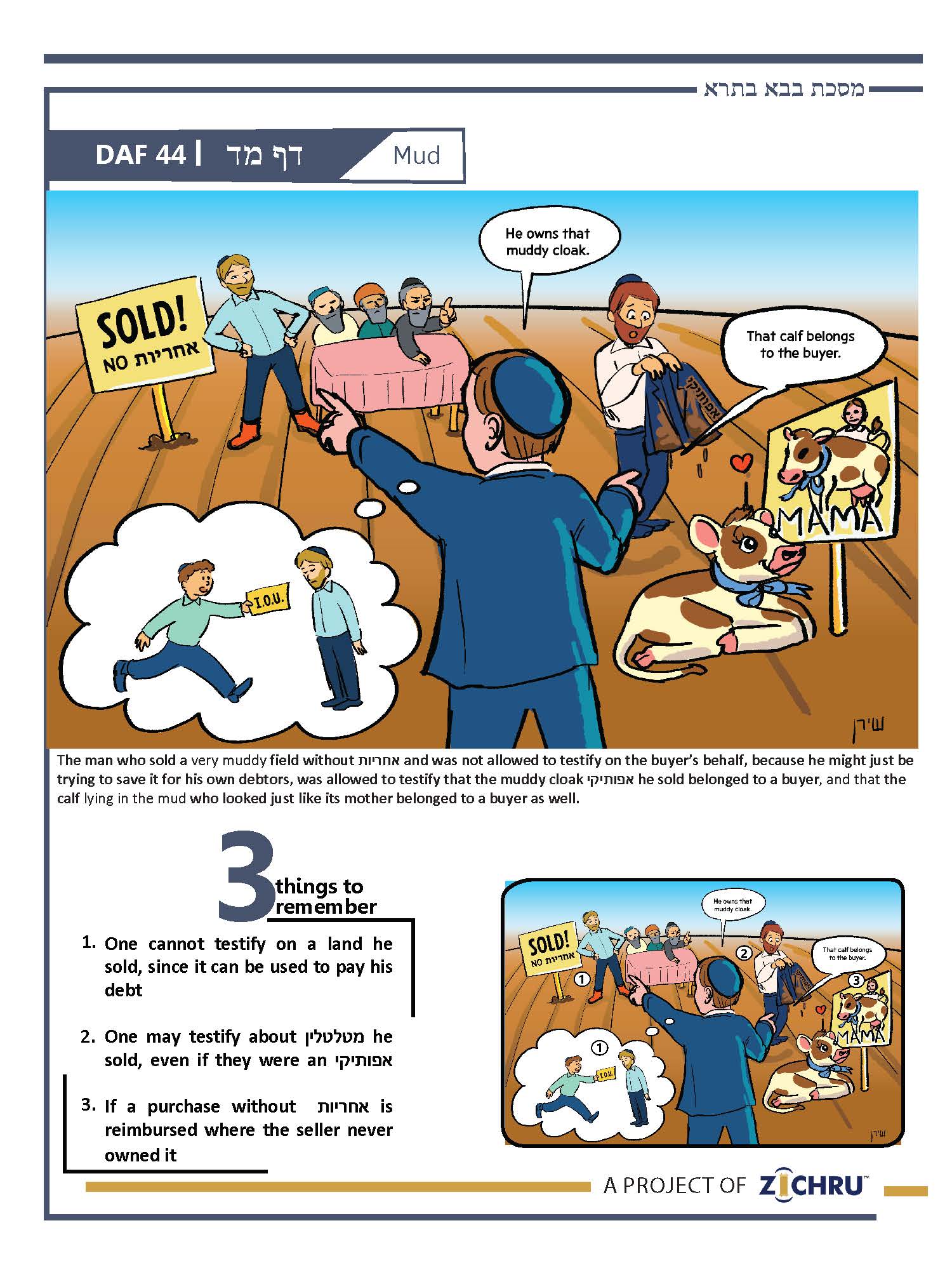Bava Basra - Daf 44
- Audio Timestamps
0:00 - The 3 Sugyos
2:44 - Review of 3 Sugyos
5:18 - Siman
8:19 - 4 Blatt Back Chazarah
16:05 - Pop Quiz (Last 7 blatt)
For access to all Zichru resources including PDFs, and illustrations CLICK HERE
- One cannot testify on a land he sold, since it can be used to pay his debt
The Gemara rejects Rav Sheishess’s interpretation of the Baraisa on the previous Daf, and instead explains that the Baraisa teaches the principle of Ravin bar Shmuel in Shmuel’s name: המוכר שדה לחבירו שלא באחריות – if one sells a field to his fellow without a guarantee, אין מעיד לו עליה – he cannot testify on [the buyer’s] behalf regarding it (against someone claiming the field was his, and not the seller’s), מפני שמעמידה בפני בעל חובו – because he places it before his creditor to collect an earlier debt. He stands to gain from his testimony, even though he would not be responsible to reimburse the buyer, because by remaining the buyer’s property, the seller’s prior debt can be collected from it. The next Daf explains that although the borrower lacks the money to pay the lender anyway, he still prefers the debt should be paid, so as not to be a לוה רשע ולא ישלם – a wicked borrower who does not pay.
- One may testify about מטלטלין he sold
The סיפא of the previous Baraisa taught that if one sold a cow or cloak, he can testify on the buyer’s behalf. Following the above interpretation, this is because these items cannot be collected by his lender (from a buyer), because they are מטלטלין. Even if they were an אפותיקי (specifically designated for collection), Rava taught they are not collected after being sold, because their being an אפותיקי does not become publicly known. The Gemara asks that perhaps the lender acquired these מטלטלין as a שיעבוד along with קרקע, because Rabbah taught: אי אקני ליה מטלטלי אגב מקרקעי – if [a debtor] conveys מטלטלין along with land to [a creditor] for a lien, קני מקרקעי קני מטלטלי – then when he acquires the lien on the land, he acquires the מטלטלין also!? The Gemara ultimately answers that the case is where witnesses testify: ידעינן ביה בהאי דלא הוה ליה ארעא מעולם – “We know about this [seller] that he never owned land,” and thus could not convey מטלטלין for a שיעבוד through אגב.
- If a purchase without אחריות is reimbursed where the seller never owned it
The Gemara persists that the seller of the cow should still have an interest in his testimony: Rav Pappa said that although if one sold property without אחריות, and it is collected by a debtor, the buyer is not reimbursed, but נמצאת שאינה שלו – if it was discovered never to have been his, חוזר עליו – [the buyer] can return to him for reimbursement, since there was no valid sale. If so, the seller of the cow should be disqualified from testifying, since he gains from his testimony!? The Gemara answers that the Baraisa’s case is: במכיר בה שהיא בת חמורו – where [the buyer] acknowledges that he recognizes [the animal] is the offspring of [the seller’s] donkey, or in our case, the seller’s cow. His admission prevents him from demanding reimbursement from the seller, even if witnesses testify that it was not the seller’s.
Rav Zevid disagrees with Rav Pappa: אפילו נמצאת שאינה שלו – even where it is discovered to have never been his, אינו חוזר עליו – [the buyer] cannot return to him for reimbursement, because the seller can say: להכי זביני לך שלא באחריות – “This is why I sold it to you without a guarantee.” Therefore, the seller has nothing to gain from testifying on the buyer’s behalf.
Siman – Mud
The man who sold a very muddy field without אחריות and was not allowed to testify on the buyer’s behalf, because he might just be trying to save it for his own debtors, was allowed to testify that the muddy cloak אפותיקי he sold belonged to a buyer, and that the calf lying in the mud who looked just like its mother belonged to a buyer as well.


